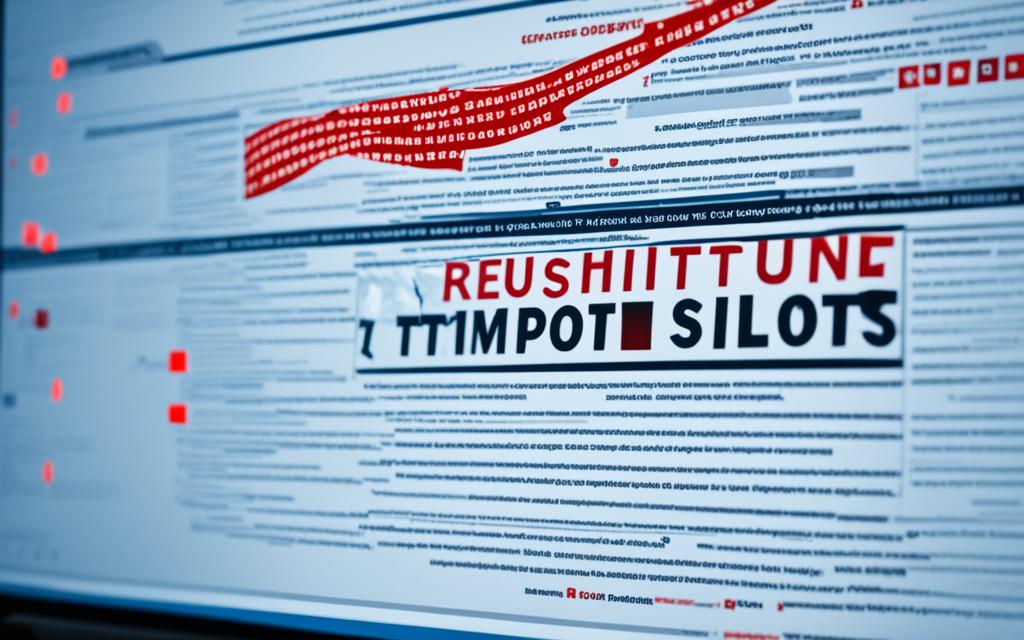In today’s digital landscape, it’s crucial for businesses of all sizes to have a solid crisis management plan in place. Building a positive brand reputation takes time, but risks to this image, from negative reviews to natural disasters, are inevitable. Businesses must be prepared to respond to a crisis and protect their reputation and brand image using online reputation management strategies. Reputation Return offers comprehensive online reputation crisis solutions to help businesses overcome digital challenges and restore their positive online image.
Key Takeaways
- Businesses must be proactive in managing their online reputation to mitigate the impact of crises.
- Reputation Return provides comprehensive solutions to help businesses recover from online reputation crises.
- Effective online reputation management strategies are crucial for protecting a business’s brand image and revenue.
- Responding quickly and appropriately to online reputation challenges can minimize the damage and help restore trust.
- Continuous monitoring and adaptation of online reputation management efforts are essential for long-term success.
What Is Online Reputation Management?
Online reputation management (ORM) is the practice of monitoring, maintaining, and enhancing a business’s public image in the digital realm. As the world becomes increasingly connected through technology, a company’s online presence has a significant impact on its success. With the rise of social media and online reviews, customers now have a powerful voice that can make or break a brand’s reputation.
Key Components of ORM
Effective online reputation management involves several crucial elements:
- Reputation Monitoring: Continuously tracking online mentions, reviews, and conversations about your brand to identify potential issues or opportunities.
- Review Generation: Proactively encouraging satisfied customers to leave positive reviews, which can help counteract any negative feedback.
- Review Management: Responding promptly and professionally to both positive and negative reviews, demonstrating your commitment to customer satisfaction.
- Reputation Crisis Management: Quickly addressing and resolving any reputation-damaging incidents or negative publicity to mitigate their impact.
By implementing a comprehensive ORM strategy, businesses can protect and enhance their online reputation, ultimately leading to increased customer trust, loyalty, and sales. For example, a software development company that actively monitors online conversations, responds to customer reviews, and partners with industry influencers can significantly improve its customer retention rates and boost its overall sales performance.
Additionally, effective SEO practices are crucial in online reputation management, as they ensure a brand’s visibility in search engine results, minimizing the impact of any negative search results. Similarly, social media marketing and influencer partnerships can be powerful tools for shaping a brand’s online reputation and reaching target audiences.
In today’s digital landscape, where a tarnished online image can have devastating repercussions, businesses must prioritize online reputation management to protect and enhance their brand’s standing. By monitoring, managing, and proactively addressing their online presence, organizations can build a strong, positive reputation that drives customer trust, loyalty, and long-term success.
Benefits of Online Reputation Management
Embracing online reputation management (ORM) can deliver a wealth of benefits for your business. By proactively monitoring and managing your online presence, you can enhance brand trust and loyalty, improve brand credibility, and elevate the customer experience.
One of the primary advantages of ORM is its ability to turn critics into fans. By rapidly addressing customer issues and concerns, you can foster a stronger emotional connection with your audience. Positive online reviews not only boost your brand credibility but also make consumers more inclined to trust your business and make purchases.
Moreover, effective ORM strategies can increase customer engagement and attract top talent to your organization. When potential employees see that your business values its online reputation and actively responds to feedback, it can become a more appealing workplace. This, in turn, can lead to a stronger, more dedicated workforce that further enhances your customer experience.
| Benefit | Impact |
|---|---|
| Enhancing Brand Trust and Loyalty | Resolving customer issues and building emotional connections can turn critics into loyal fans. |
| Improving Brand Credibility | Positive online reviews boost a brand’s credibility, making consumers more likely to trust the business and make purchases. |
| Elevating Customer Experience | Effective ORM strategies can increase customer engagement and attract top talent, further enhancing the overall customer experience. |
By leveraging the power of online reputation management, businesses can unlock a wealth of advantages that ultimately drive growth, success, and a lasting, positive impression with their target audience.
Understanding Crisis Management
In today’s digital landscape, a company’s reputation can be significantly impacted by unexpected adverse events. Crisis management refers to the processes and strategies a business employs to prepare for and manage any disruptive situation that can harm the organization. A robust crisis management plan helps define a crisis, identify who is in charge if one occurs, and outline the steps to be taken to mitigate legal repercussions and protect the brand’s reputation.
Developing a comprehensive crisis management plan involves several key steps:
- Identifying potential crises that could arise, such as negative reviews, social media blunders, legal issues, or data breaches.
- Determining the potential impact of these crises on the organization’s operations, finances, and public image.
- Choosing the most suitable response methods to address and resolve the crisis, including communication strategies, content removal, and reputation management tactics.
By proactively addressing reputation crisis management and conducting thorough risk analysis, organizations can enhance their ability to respond effectively to unexpected events, minimize damage, and emerge stronger from a crisis.
The speed at which information can spread online underscores the importance of having a well-defined crisis management plan in place. With social media, traditional media, and citizen journalism operating 24/7, organizations must be prepared to respond promptly and effectively to prevent a crisis from escalating. By leveraging the right tools and strategies, businesses can navigate reputation challenges and focus on growth and success.
Common Reasons for Failing to Respond to Crises
Businesses may stumble in responding to a crisis for various reasons. Some fail to anticipate potential crises, while others underestimate the importance of effective crisis management. Neglecting to conduct comprehensive risk analyses and missing early warning signs often leave companies unprepared to address adverse events, leading to irreparable damage to their brand reputation and business performance.
A lack of crisis preparedness can have severe consequences. According to the World Economic Forum, 69% of business leaders have experienced at least one crisis in the last year. Businesses with 5,000 or more employees are likely to face a crisis every year. Unfortunately, 34% of businesses who have already experienced a expressed that they wish they had done more to identify crisis scenarios.
Effective crisis response requires proactive measures. Actions taken in the first 60 minutes during a crisis will determine how any incident will be managed, perceived, and reported. Social listening and monitoring can help brands stay ahead of potential crises by tracking brand mentions, competitors, and industry updates in real-time. Setting up alerts and signals can also enable businesses to identify potential crises early and take swift action.
Businesses that fail to respond promptly and appropriately to crises often find themselves facing severe reputational and financial consequences. Online complaints can be turned into positive publicity with immediate and constructive responses. The success of online customer service is often determined by the speed of reaction, making crisis preparedness a critical component of any organization’s risk mitigation strategy.
| Statistic | Percentage |
|---|---|
| Businesses with 5,000+ employees who experience a crisis every year | 100% |
| Businesses who have experienced a crisis and wish they had done more to identify crisis scenarios | 34% |
| Consumers who ‘always’ or ‘regularly’ read online reviews when browsing for local businesses in 2021 | 77% |
| Consumers who specifically look for negative reviews at least sometimes, up from 85% in 2018 | 96% |

The 7 Steps of Crisis Management Planning
Effective crisis management planning is crucial for any business or individual seeking to protect their online reputation. This comprehensive process involves seven key steps that can help you navigate challenging situations and minimize the impact of reputation-damaging events.
Identify Potential Crises
The first step in crisis management planning is to identify potential crises that could arise, such as natural disasters, financial crises, personnel issues, or technological failures. By anticipating and understanding these crisis management plan scenarios, you can be better prepared to respond quickly and effectively.
Determine Crisis Impacts
Once you’ve identified potential crises, the next step is to assess how each one could impact your business, customers, employees, and stakeholders. This analysis will help you prioritize your crisis prevention efforts and allocate resources accordingly.
Choose Response Methods
With a clear understanding of potential crises and their impacts, you can then select the most suitable crisis response strategies for your organization. This may involve proactive or reactive crisis management approaches, depending on the nature and severity of the situation.
- Establish clear communication protocols
- Train employees on crisis response procedures
- Test the crisis management plan
- Monitor for potential crises and update the plan as needed
By following these seven steps, you can develop a comprehensive crisis management plan that will help you navigate reputation-damaging events and protect your online presence.
Online Reputation Crisis Solutions
In today’s digital landscape, effectively managing an online reputation crisis is crucial for businesses and individuals alike. Reputation Return offers comprehensive solutions to help you navigate these challenges and restore your positive online image.
Their team of experts utilizes the latest tools and strategies in digital reputation recovery, online reputation repair, and reputation management services. They begin by closely monitoring your online presence, identifying any negative content or reviews that could be damaging your brand’s reputation. This proactive approach allows them to quickly address emerging issues before they escalate into full-blown crises.
When a crisis does occur, Reputation Return’s crisis management expertise shines. They develop tailored response plans, expertly managing the situation to mitigate the impact and protect your online reputation. This includes tactics like review generation, review management, and strategic communication to address concerns and rebuild trust with your audience.
Whether you’re facing a sudden PR disaster or dealing with a steady stream of negative reviews, Reputation Return has the tools and expertise to help. Their comprehensive digital reputation recovery, online reputation repair, and reputation management services are designed to identify problems, implement effective solutions, and safeguard your brand’s positive online presence.
| Service | Description |
|---|---|
| Reputation Monitoring | Continuously track mentions, reviews, and conversations about your brand across the web to stay ahead of potential crises. |
| Review Generation | Proactively collect positive reviews from satisfied customers to boost your online ratings and build trust. |
| Review Management | Respond professionally to both positive and negative reviews, maintaining a constructive dialogue with your audience. |
| Reputation Crisis Management | Develop and execute tailored strategies to swiftly address and resolve online reputation crises, minimizing the damage. |
By partnering with Reputation Return, you can take control of your online narrative and ensure your brand’s reputation remains strong and resilient, even in the face of digital challenges.

Proactive Online Reputation Monitoring
Maintaining a strong online presence is crucial in today’s digital landscape. Online reputation monitoring is a vital component of effective reputation management, allowing businesses to stay ahead of potential crises and address any negative feedback promptly.
By continuously monitoring your brand’s online presence across search engines, review sites, and social media platforms, you can quickly identify and address any emerging issues. Reputation Return’s advanced monitoring tools and expert analysts can help you stay on top of your online reputation, enabling you to respond proactively and prevent small problems from escalating into full-blown crises.
Regular social media monitoring and review monitoring are essential for understanding how your brand is perceived online. Ninety-eight percent of consumers read online reviews for local businesses, and 94 percent avoid a company due to a bad review. By actively engaging with your customers and addressing their feedback, you can build trust, increase customer loyalty, and protect your brand’s reputation.
Proactive online reputation monitoring is not just about responding to negative feedback; it’s also about amplifying the positive. Positive social media interactions can result in customers being more likely to choose a brand over others (77 percent), remember the brand (76 percent), and increase spending with the brand (72 percent).
Partnering with a reputation management expert like Reputation Return can provide you with the tools and strategies you need to effectively monitor and manage your online reputation. By staying on top of your brand’s digital presence, you can ensure that your business is positioned for long-term success in the ever-evolving digital landscape.
Conclusion
In the digital age, your online reputation is a critical factor in the success of your business. You must be proactive in managing your online presence, both to maintain a positive brand image and to be prepared to respond quickly to any reputation-damaging events. Reputation Return’s comprehensive online reputation crisis solutions empower businesses like yours to overcome digital challenges, restore your positive online presence, and build long-term trust and loyalty with your customers. By leveraging advanced online reputation management strategies and tools, Reputation Return helps you protect your brand reputation and drive business growth.
The importance of online reputation management cannot be overstated, as 88% of brand executives consider reputation risk a top strategic business concern, and over 65% of business leaders believe that social media can exacerbate a brand crisis. As Warren Buffet wisely said, “It takes 20 years to build a reputation and five minutes to ruin it.” Quantifying changes in corporate reputation, stakeholder perception, and negative brand attitude is crucial to gauge the severity of a reputation crisis and take appropriate action.
By addressing online reputation challenges head-on and implementing effective crisis management strategies, you can not only restore your brand’s positive image but also strengthen consumer trust and loyalty in the long run. Reputation Return’s expertise in online reputation management is your key to overcoming digital obstacles and positioning your business for long-term success in the competitive marketplace.

